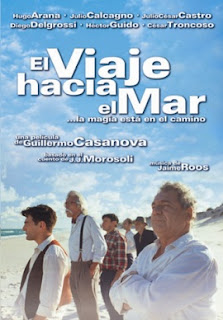Seawards Journey (2003)
Director: Guillermo Casanova
Country: Uruguay-Argentina
Runtime:73min
It's a Sunday morning 1963 in a bar in a town of Minas. Rataplan, the sweeper, Quintana, the undertaker, Seven and Three Ten, the seller of lottery Aquino and her dog, waiting for Rodriguez, who's going to take you to see the sea for the first time.The Basque, his foreman, reluctantly accompanies them. Fresh from the capital, an elegant Unknown joins the entourage at the last minute. Along the journey, the sun, in the ramshackle truck Rodriguez, the six characters will reveal his particular way of living and feeling surrounded by green landscapes of the mountains to the coast and the unknown sea ...
The trip to the Sea is based on the story of the same name of the author Juan José Morosoli Minuano, first published in 1952. Uruguayan director Guillermo Casanova (with the collaboration of Julio Cesar Castro "Juceca" in the dialogues) made this kind of "road movie" Creole on six characters starting from a small town in the interior to meet the sea.
For the filming, the team consisting of about 50 people, including technicians and actors, he moved to the city of Minas, the capital of the Department of Lavalleja to 122 km from Montevideo on Route 8.In the first four weeks were filmed scenes involving landscapes Lavalleja saws and locations in the cities of Mines and Aiguá Maldonado, 153 km from Montevideo with reconstruction of the Route 13 era (the film is set in 1963) . In the last week were shot in Atlantis Mdeo 45 km. Route Interbalnearia, Costa Azul and Parque del Plata, the scenes of the resort and the beach.
The journey to the sea was one of the awards in 1999 FONA also support Ibermedia Program in 2001. It is the first feature film by Guillermo Casanova, and it has won the top prize at the 29th Latin American Film Festival of Huelva and a special prize of the Official College of Architects of Huelva.
Director: Guillermo Casanova
Country: Uruguay-Argentina
Runtime:73min
It's a Sunday morning 1963 in a bar in a town of Minas. Rataplan, the sweeper, Quintana, the undertaker, Seven and Three Ten, the seller of lottery Aquino and her dog, waiting for Rodriguez, who's going to take you to see the sea for the first time.The Basque, his foreman, reluctantly accompanies them. Fresh from the capital, an elegant Unknown joins the entourage at the last minute. Along the journey, the sun, in the ramshackle truck Rodriguez, the six characters will reveal his particular way of living and feeling surrounded by green landscapes of the mountains to the coast and the unknown sea ...
The trip to the Sea is based on the story of the same name of the author Juan José Morosoli Minuano, first published in 1952. Uruguayan director Guillermo Casanova (with the collaboration of Julio Cesar Castro "Juceca" in the dialogues) made this kind of "road movie" Creole on six characters starting from a small town in the interior to meet the sea.
For the filming, the team consisting of about 50 people, including technicians and actors, he moved to the city of Minas, the capital of the Department of Lavalleja to 122 km from Montevideo on Route 8.In the first four weeks were filmed scenes involving landscapes Lavalleja saws and locations in the cities of Mines and Aiguá Maldonado, 153 km from Montevideo with reconstruction of the Route 13 era (the film is set in 1963) . In the last week were shot in Atlantis Mdeo 45 km. Route Interbalnearia, Costa Azul and Parque del Plata, the scenes of the resort and the beach.
The journey to the sea was one of the awards in 1999 FONA also support Ibermedia Program in 2001. It is the first feature film by Guillermo Casanova, and it has won the top prize at the 29th Latin American Film Festival of Huelva and a special prize of the Official College of Architects of Huelva.















